The Mechanical Testing Equipment Market is estimated to be valued at USD 8.5 billion in 2025 and is projected to reach USD 27.7 billion by 2035, registering a compound annual growth rate (CAGR) of 12.5% over the forecast period.
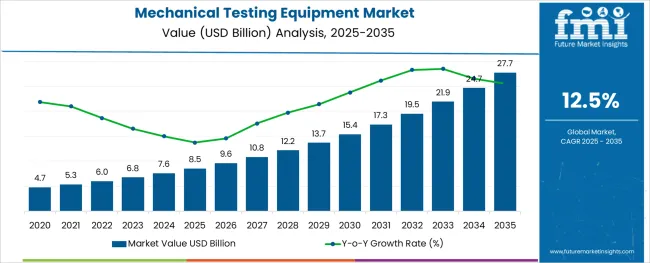
The mechanical testing equipment market is expanding as industries increasingly prioritize material quality and product reliability. Manufacturing sectors are demanding precise and comprehensive testing solutions to ensure components meet strict safety and performance standards. Advancements in testing technology have improved accuracy and data analysis capabilities, supporting quality control in diverse applications.
Regulatory frameworks and certification requirements have also reinforced the importance of reliable mechanical testing in production workflows. Growth in manufacturing activities, especially in automotive, aerospace, and construction industries, is driving demand for equipment that can assess material strength, durability, and mechanical properties.
Looking ahead, the market is expected to benefit from digital integration and automation, improving testing efficiency and reporting. The Universal Testing Machine is anticipated to lead equipment types, while manufacturing remains the dominant end-use sector.
The market is segmented by Equipment Type and End Use and region. By Equipment Type, the market is divided into Universal Testing Machine, Fatigue Testing Machine, and Special Testing Machine. In terms of End Use, the market is classified into Manufacturing, Civil Engineering, Pharmaceutical Industry, Scientific Institutions, and Others. Regionally, the market is classified into North America, Latin America, Western Europe, Eastern Europe, Balkan & Baltic Countries, Russia & Belarus, Central Asia, East Asia, South Asia & Pacific, and the Middle East & Africa.
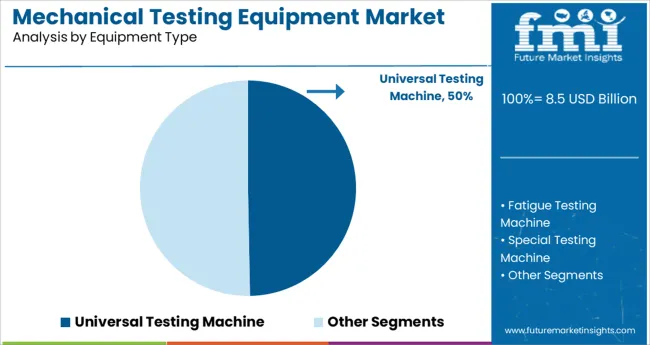
The Universal Testing Machine segment is projected to hold 49.7% of the mechanical testing equipment market revenue in 2025, securing its position as the leading equipment type. This dominance stems from the versatility of universal testing machines, which can perform multiple tests including tensile, compression, and bending across various materials.
Their ability to provide accurate, repeatable results has made them essential in quality assurance processes across industries. The machines’ compatibility with digital interfaces and software has further enhanced usability and data management.
As manufacturers increasingly require multifaceted testing capabilities to meet evolving standards, universal testing machines continue to be the preferred choice.
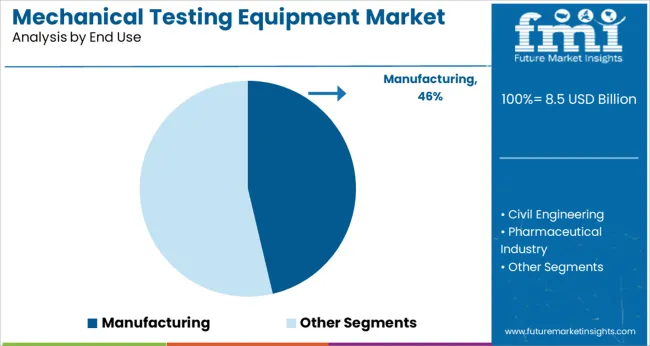
The manufacturing segment is expected to account for 46.3% of the market revenue in 2025, maintaining its leadership among end-use industries. This growth is fueled by the critical need for material and component testing to ensure product safety, compliance, and performance in manufacturing workflows.
Manufacturing sectors such as automotive, aerospace, and heavy machinery rely heavily on mechanical testing to validate design specifications and monitor quality throughout production. Rising adoption of advanced materials and complex manufacturing techniques has intensified the requirement for robust testing equipment.
As global manufacturing activity expands and quality regulations tighten, the manufacturing segment is positioned to sustain strong demand for mechanical testing equipment.
As the trend of industrialization continues to create deeper inroad, a substantial rise in manufacturer activities is being witnessed, especially across emerging economies such as China, India, Australia, Brazil, and others.
With rising rate of production, it is becoming crucial for manufacturers to integrate mechanical testing equipments in manufacturing processes to maintain and control the quality of the products.
Physical and mechanical tests are of great importance for the purpose of quality control in manufacturing industries as well as assess the product damage after accidents. Thus, growing adoption of quality control and quality assurance process across the industrial manufacturing sector is estimated to create high revenue generation opportunities in the global market.
Extravagant initial cost of mechanical testing equipments, high installation cost, and high cost of maintenance are the factors hindering the sales in the market. In addition to this, need for skilled professionals and stringent regulations & standards for mechanical testing across various countries are restraining the growth in the global market.
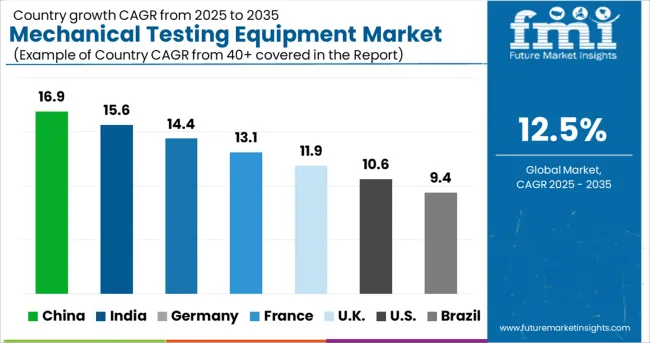
FMI reveals that Asia Pacific excluding Japan is estimated to emerge as the most lucrative market for mechanical testing equipment during the forecast period 2025-2035.
Due to the surging trend of urbanization and growing emphasis on sustainable infrastructure developments, a rapid surge in building and construction activities is being witnessed across Asia Pacific.
Hence, governments in several countries are aiming on undertaking numerous initiatives for urbanizing rural areas and constructing smart cities.
For instance, according to a study by the India Brand Equity Foundation, the Indian Government announced allocating around USD 7.6 Million under the country’s Smart City Mission to build more than 100 smart cities across India for the period 2024-2025.
As mechanical testing equipment plays a critical role in testing the durability, strength, and safety of material used in building activities, such rise in construction activities will bolster the sales in the market.
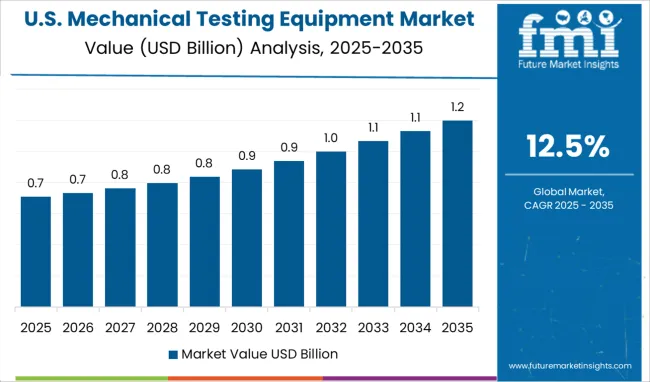
As per Future Market Insights, North America is expected to account for a significant share in the global mechanical testing equipment market between 2025 and 2035.
Mechanical testing equipment is finding a wide array of usages in the manufacturing industry for various applications ranging from determining the strength of a bridge to the elasticity of a rubber band.
These equipments are increasingly gaining popularity for the testing of packaging materials for food & beverages, industrial goods, medical & pharmaceutical products, and others.
They are extensively used in testing various parameters such as elasticity, flexibility, rigidity, adhesion shock, vibration, tensile, and shear tests of packaging solutions. This is expected to favor the demand for mechanical testing equipments in the North America market.
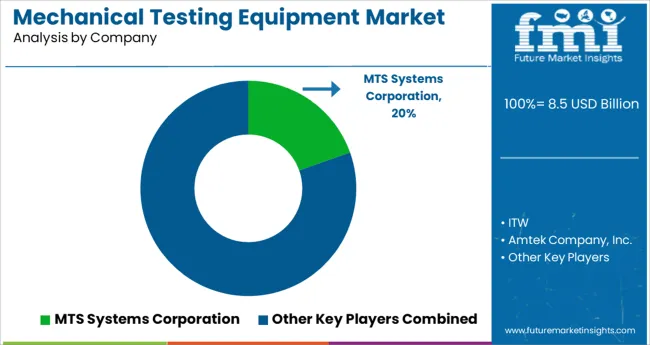
Some of the leading players in the mechanical testing equipment market are Torontech Group International, AMETEK, Shimadzu, Applied Test Systems, Hegewald & Peschke, INSTRON, Zwick/ Roell, MTS Systems, and others.
The market is highly competitive attributed to the presence of such a large number of participants and increasing adoption of product launch and collaboration, partnership, and acquisition strategies.
| Report Attribute | Details |
|---|---|
| Growth Rate | CAGR of 12% to 13% from 2025 to 2035 |
| Base Year for Estimation | 2024 |
| Historical Data | 2020 to 2024 |
| Forecast Period | 2025 to 2035 |
| Quantitative Units | Revenue in million and CAGR from 2025 to 2035 |
| Report Coverage | Revenue Forecast, Volume Forecast, Company Ranking, Competitive Landscape, Growth Factors, Trends and Pricing Analysis |
| Segments Covered |
Equipment Type, End Use, Region |
| Countries Covered | North America; Latin America; Europe; CIS & Russia; APEJ; Japan; Middle East and Africa |
| Key Companies Profiled |
Torontech Group International; AMETEK; Shimadzu; Applied Test Systems; Hegewald & Peschke; INSTRON; Zwick/ Roell; MTS Systems; Others |
| Customization | Available Upon Request |
The global mechanical testing equipment market is estimated to be valued at USD 8.5 billion in 2025.
It is projected to reach USD 27.7 billion by 2035.
The market is expected to grow at a 12.5% CAGR between 2025 and 2035.
The key product types are universal testing machine, fatigue testing machine and special testing machine.
manufacturing segment is expected to dominate with a 46.3% industry share in 2025.






Full Research Suite comprises of:
Market outlook & trends analysis
Interviews & case studies
Strategic recommendations
Vendor profiles & capabilities analysis
5-year forecasts
8 regions and 60+ country-level data splits
Market segment data splits
12 months of continuous data updates
DELIVERED AS:
PDF EXCEL ONLINE
Mechanical Shaft Seal Market Size and Share Forecast Outlook 2025 to 2035
Mechanical And Electronic Fuzes Market Size and Share Forecast Outlook 2025 to 2035
Mechanical Reciprocating Engine Market Size and Share Forecast Outlook 2025 to 2035
Mechanical Locks Market Analysis - Size, Share, and Forecast Outlook 2025 to 2035
Mechanical Coil Tester Market Analysis - Size, Share, & Forecast Outlook 2025 to 2035
Mechanical Performance Tuning Components Market Growth - Trends & Forecast 2025 to 2035
Mechanical Ventilator Market - Demand & Growth Outlook 2025 to 2035
Mechanical Seals Market Growth - Trends & Forecast 2025 to 2035
Understanding Market Share Trends in the Mechanical Locks Industry
Mechanical Keyboard Market
Electromechanical Timers Market Size and Share Forecast Outlook 2025 to 2035
Bicycle Mechanical Disc Brake Market Size and Share Forecast Outlook 2025 to 2035
Dynamic Mechanical Analyzer Market
Chemical Mechanical Planarization Market Growth – Size & Forecast 2025 to 2035
Nanoelectromechanical Systems (NEMS) Market - Trends & Forecast 2025 to 2035
Micro-electromechanical System (MEMS) Market Size and Share Forecast Outlook 2025 to 2035
Micro-Electro Mechanical Systems Market Size and Share Forecast Outlook 2025 to 2035
High Precision Mechanical Machine Components Market Size and Share Forecast Outlook 2025 to 2035
Testing, Inspection & Certification Market Growth – Trends & Forecast 2025 to 2035
5G Testing Market Size and Share Forecast Outlook 2025 to 2035

Thank you!
You will receive an email from our Business Development Manager. Please be sure to check your SPAM/JUNK folder too.
Chat With
MaRIA